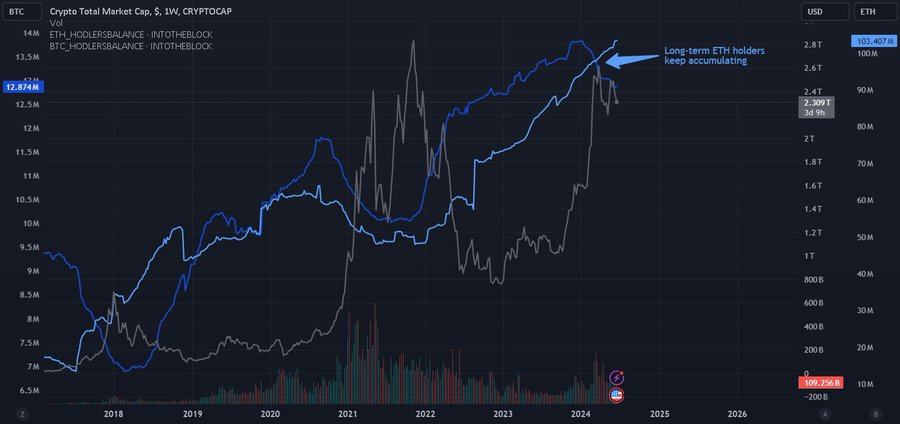Long-term Bitcoin (BTC) holders have started selling the holding they accumulated throughout the bear market back in January, when spot Bitcoin exchange-traded funds (ETFs) were listed in the United States. Long-term Ethereum (ETH) holders, however, are still accumulating.
That’s according to data shared by on-chain analysis firm IntoTheBlock, with the firm noting that the behavior of long-term holders is critical to understanding market cycles as historical data “shows that this profit-taking usually begins in the early stages of a bull market and continues past the cycle peak.”
Bitcoin’s influence in the cryptocurrency space means, per the firm, it’s “often the most straightforward asset to use for measuring these cycles” as other digital assets tend to follow the flagship cryptocurrency’s leading.
There’s, however, a notable divergence as long-term ETH holders are currently still accumulating new tokens which “contrasts sharply with their behavior in the last cycle, where it closely mirrored that of Bitcoin holders.”

This deviation from the traditional pattern is likely driven by the emergence of attractive yield opportunities within the Ethereum ecosystem, IntoTheBlock noted. Unlike Bitcoin, Ethereum offers staking mechanisms that allow holders to earn passive income on their holdings, and there are additional yield strategies within the decentralized finance space.
According to a recent analysis, a staggering 27.5% of the total ETH supply is currently staked, with a significant portion (16.3%) being re-invested through protocols like Eigenlayer, Karak Network, and Symbiotic to further the yield being generated.
Furthermore, the potential approval of a spot-traded Ethereum ETF could be another factor influencing the behavior of long-term holders. These investors might be waiting for this regulatory milestone and a potential surge in price to new all-time highs before considering selling their ETH.
Last month, the SEC approved applications from major stock exchanges to list spot Ether ETFs, clearing the path for these products to start trading later this year. The approval marks a significant shift for the SEC, which has historically been cautious about cryptocurrency and had been investigating whether to deem the second-largest cryptocurrency a commodity or a security.
While the exchange applications were approved, individual ETF issuers including VanEck, ARK Investments, and BlackRock still need the SEC to greenlight their registration statements before trading can begin.
It’s worth noting that over 83% of current ETH holders are already sitting on a profit, and with additional catalysts on the horizon, the asset could be poised for a significant rally. While over 89% of BTC holders are currently in a state of profit, investors holding the cryptocurrency appear to be more bearish.
Featured image via Pixabay.









